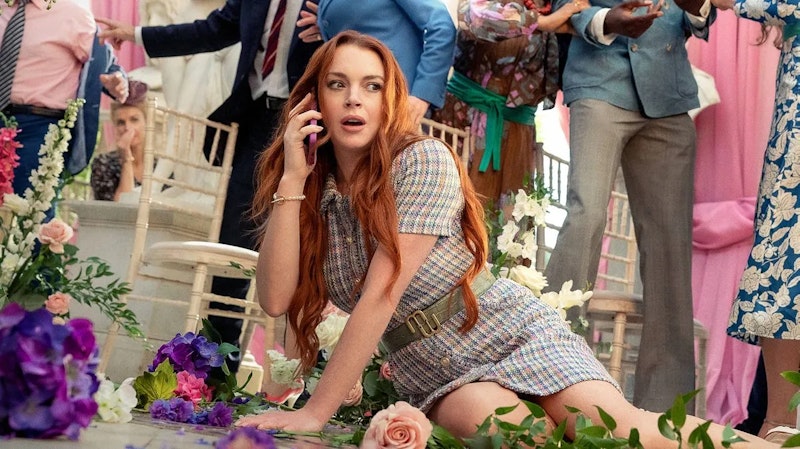“It's one thing to edit a book,” James tells Maddy in the new Netflix film Irish Wish. “But,” he adds,” you really shouldn’t go on editing your own life.”
The moral here is that Maddy (Lindsey Lohan) needs to stop trying to be someone she’s not. The less obvious moral is that fans of the romance genre need to stop dreaming of distant, fictional romance and seize the romance in their own life. Director Janeen Damian and writer Kirsten Hansen have created a self-critique of their own fantastical genre—a self-critique which magically makes the fantasy more believable. As in Jane Austen’s Northanger Abbey, when the author tells you that she knows that romance isn’t real, it makes her promise of romance more, rather than less, credible.
Somewhat inevitably in such a self-referential film, Maddy’s an editor and would-be novelist. At the beginning of the movie, she has a crush on her star writer Paul Kennedy (Alexander Vlahos), whose book she heavily reworked, turning it into a huge hit. She’s too shy to tell Paul about her feelings, though, and he ends up engaged to her best friend Emma (Elizabeth Tan).
At the wedding at Paul’s stunning Irish estate, Maddy stumbles on Saint Brigid (Dawn Bradfield), who grants her heart’s wish—she wants to be the one marrying Paul Kennedy. And so, magically, it’s no longer Emma’s wedding eve, but her own.
Maddy should be happy! But instead she feels like someone who’s started reading that romance in the middle, and missed out on key scenes—like the wedding proposal, which she can’t remember. Worse, Maddy finds herself attracted to the wedding photographer, James (Ed Speleers). Paul and Emma, meanwhile, have feelings for each other even in this alternate reality. Be careful what you wish for, Maddy.
Telling romance fans to be careful what they wish for is on point and hypocritical. Romance is a wish or a fantasy; the audience for Irish Wish (including me) wants to spend a pleasant hour and a half imagining themselves out of their own humdrum lives and into a more exciting, more beautiful world—one with dramatic Irish cliffs, for example. They want to imagine themselves in love with some fabulous someone—a dreamy wealthy, dashing successful writer, for instance.
Romance can be seen as a kind of fantasy infidelity. Irish Wish is very aware of that possibility. Though Maddy, in the alternate timeline, shares a room and a bed with Paul, the script’s careful not to have them do anything too inappropriately sexual. Maddy covers her eyes when she realizes Paul’s in their shared bathroom naked. When he puts his arm over her at night, she freaks out and accidentally kicks him in the balls. We don’t even ever see the two of them kiss.
Maddy’s wish can’t come too true, or she’s unfaithful to her true self and true life. Romance readers don’t in general really want to marry a stranger, any more than James Bond fans want to really be an international spy with all the attendant dangers. The dream of love has to stay a dream for it to be enjoyable.
You don’t want the dream to abandon plausibility completely, though, or you can’t suspend disbelief, and where’s the wish fulfillment in that? Irish Wish, with the indulgence of its viewers, plays a shell game. It warns its viewers not to let themselves get sucked into a fantasy of who they should love and who they should be. And then, as an alternative, it offers a reality which is also a fantasy: James, the dashing photographer, who isn’t wealthy, but who believes in and wants to encourage Maddy’s own novel-writing.
James wants Maddy to believe in her real self. But that’s also a fantasy; Maddy isn’t a real person, and her “true” story is as much fiction as the alternate, “unreal” wish world. Maddy’s relationship with Paul is a dream within a dream, a fantasy within a fantasy. The false path isn’t really there to lead her to the true one, as Saint Brigid suggests. Rather, the movie identifies the false path as false so the other false path takes on greater verisimilitude. The fantasy’s more solid, believable, and entertaining when it’s self-aware enough to dispel itself before it ushers you into the real wish.
This isn’t to say that a fantasy can’t have real life applications; “Don’t let your stupid boyfriend steal your ideas and put his name on them,” is solid advice. (The suggestion that real men don’t let women propose to them is maybe less so.) Nor is the point here that romance fans are dupes. On the contrary, the multi-level meta-fiction of Maddy’s multi-narrative suggests that romance fans are self-aware and they enjoy stories that play with the genre’s tropes of wish-fulfillment and with the semi-buried guilty thrill of imagined infidelity. Irish Wish provides the fantasy its viewers want by not giving them the fantasy they want. That’s how the romance genre, and much of fiction, works.

